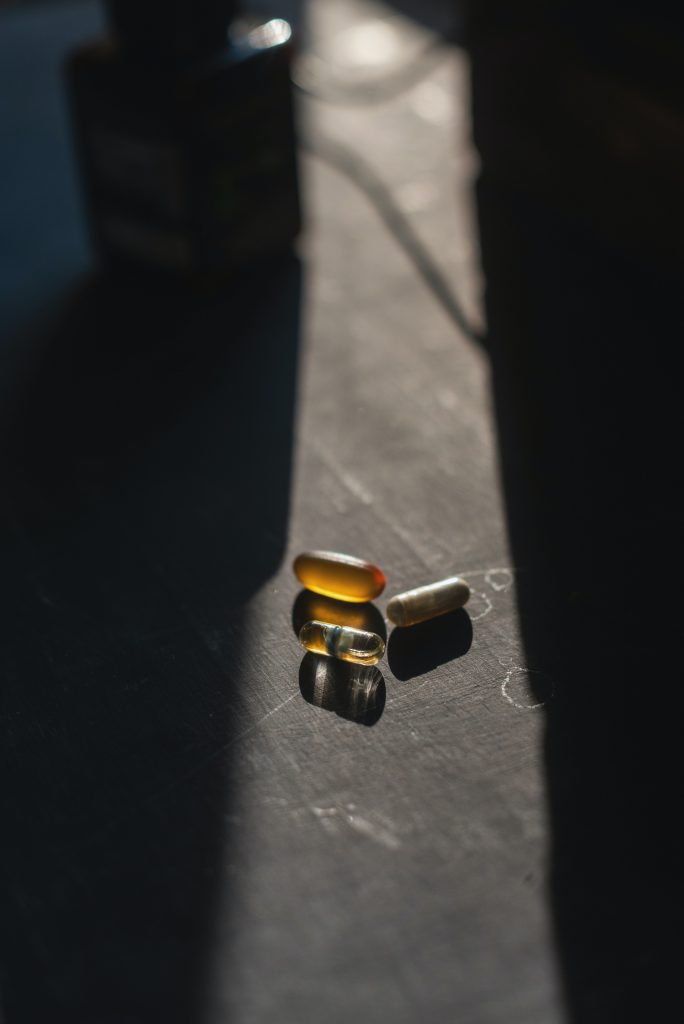Advertisement
The Ultimate Guide to Supplements
Buying supplements can be confusing—so let's simplify it

Let’s get this out of the way first: Almost no one eats a perfect diet every day. (For example, about 90 percent of Americans eat more sodium than is considered healthy.) Sometimes, you might want wine instead of a smoothie. Every now and then, you might choose takeout pizza over a homemade salad. And that’s okay.
Because we all have different nutrient needs, here are some of the basic supplements each family member should be taking.*
*This goes without saying … but we’re going to say it anyway: Always check with your health care practitioner for proper dosing and safety instructions before taking any new supplements.
Advertisement
 For women under 40
For women under 40
Because of hormonal changes and menstruation (ugh), women can benefit from getting more of certain nutrients.
Folate
Folate, aka folic acid, is a B vitamin that’s essential for helping to prevent birth defects. But it’s not just for pregnant women. The Centers for Disease Control and Prevention (CDC) urges all women who are even capable of becoming pregnant to take a daily folic acid supplement.
What to look for: All women who could become pregnant should get 400 mcg of folic acid every day. Pregnant women and breastfeeding women need 600 mcg and 500 mcg, respectively.
Vitamin D
Reality check: up to three-quarters of Americans are deficient in the sunshine vitamin. In general, men tend to have higher levels of vitamin D than women. In winter—and even in summer, if you can’t get enough sun exposure—supplements are a must.
What to look for: Vitamin D supplements come in two types: D3 (typically made from sheep wool or fish oil) and D2 (made by exposing yeast or mushrooms to UV rays). D3 is slightly easier to absorb, but vegans should opt for D2 unless they can locate plant-based D3.
Magnesium
Ladies, take note: This miracle mineral has been shown to ease PMS symptoms, including bloating and insomnia. Several studies suggest that magnesium may be a valuable addition to some treatment plans for depression.
What to look for: Pop a B-complex vitamin with magnesium to increase your absorption of the latter.
Iron
Iron deficiency is especially common among women (for obvious reasons). If you look paler than usual and feel exhausted, even if you’re super fit, low iron might be to blame. Talk to your health care practitioner to get your iron status assessed.
What to look for: Take iron supplements with a source of vitamin C, like strawberries, to help improve absorption.
Advertisement
 For men under 40
For men under 40
Compared to women, men are less likely to eat five or more servings of fruits and veggies per day—leaving some guys with nutritional gaps. Men are also at greater risk of developing heart disease at a younger age.
CoQ10
An antioxidant, coenzyme Q10 (CoQ10) is best known for helping to treat heart-related conditions such as chronic heart failure and high blood pressure.
What to look for: The ubiquinol form of CoQ10 seems to be better absorbed. Take it in the evening, with a meal that contains fat, to best absorb its antioxidant goodness.
Boron
Meet boron: one of the best supplements men can take to help lower the risk of prostate cancer. In fact, research suggests that guys with higher levels of boron may be 52 percent less likely to develop prostate cancer than those with lower levels.
What to look for: Although no recommended dietary allowance (RDA) has been established for boron, consider supplementing with up to 3 mg per day.
Lycopene
This powerful antioxidant is well known for giving tomatoes their rich red hue. Why should men aim to get more? Well, because research has linked higher levels of lycopene with a reduced risk of heart disease and prostate cancer.
What to look for: Lycopene dosages vary depending on why you’re taking it. As an antioxidant, for example, 30 mg of lycopene may be taken daily for up to eight weeks.
Asian ginseng
Asian ginseng has been used in Chinese medicine for thousands of years. Studies show that it could help improve concentration and reduce fatigue. Plus, men who experience erectile dysfunction may find that ginseng helps banish their bedroom blues.
What to look for: For best results, some experts recommend taking ginseng for no more than three months. After a short break, it may be taken again for another few weeks or months.
Advertisement
 For people over 50
For people over 50
As you age, your body just can’t absorb some nutrients as well as it did 20 or 30 years ago. Supplements can help.
Vitamin B12
B12 is essential for keeping blood and nerves in tip-top shape. But up to one-third of older individuals have trouble absorbing B12 from food.
What to look for: Supplementing with 25 to 100 mcg of vitamin B12 per day has been shown to help maintain B12 levels in older people.
Glucosamine & chondroitin
This dynamic duo is often combined in one supplement to relieve joint pain in those with osteoarthritis. Some runners and other athletes have found that this combo also relieves exercise-induced knee pain.
What to look for: Glucosamine supplements are often made from shellfish, so choose a plant-based version if you are vegan or have a shellfish allergy.
Vitamin D
Our ability to produce vitamin D from the sun declines with age: When you hit 70, you’ll produce less than 30 percent of the vitamin D you did when you were young from the same amount of sun exposure.
What to look for: One study found that taking vitamin D with the largest meal of the day (typically dinner) boosts absorption.
Calcium
Yes, calcium strengthens your bones and teeth. But it’s not a one-trick pony. The most abundant mineral in your body, calcium may also lower blood pressure and protect against some cancers. Aging individuals need more of this super mineral to help prevent fractures.
What to look for: Calcium is best absorbed when taken in small doses— 500 mg or less—with food.
Advertisement
 For the kids
For the kids
Yep, kids can benefit from supplements too. Always look for child-specific supplements, as kids’ immune, digestive and central nervous systems differ from those of adults.
Multivitamin
A multi delivers vital nutrients kids are often lacking, especially if your little ones are picky eaters or eat a vegetarian or vegan diet.
What to look for: Find a whole-food multi made specifically for children, and make sure sugar isn’t the first ingredient.
Probiotics
These good-for-you bacteria can ease occasional tummy troubles and help support a healthy immune system.
What to look for: Two probiotic strains, Lactobacillus GG and Saccharomyces boulardii, have shown the most promise in preventing and treating diarrhea. Research suggests a dosage of 5 to 10 billion CFUs per day for children.
Omega-3s
These fab fats are critical for brain health. Some studies have even linked low levels of omega-3s with poorer reading ability in kids and found that supplementation improved memory. Getting adequate omega-3s may also improve some symptoms of ADHD.
What to look for: Snag omega-3 supplements in kid-friendly flavors like chocolate and strawberry.
Advertisement
 For vegans & vegetarians
For vegans & vegetarians
Although vegan and vegetarian diets have plenty of health benefits, plant foods are lacking in certain nutrients—that’s where supplements come in.
Iron
All people on plant-based diets should watch their iron intake, as only animal-based foods provide easily absorbed heme iron (plant-based foods provide nonheme iron, which is less readily absorbed). Vegan athletes, especially runners, should pay special attention to iron due to exercise-induced iron loss. When iron levels dip, you may feel tired and less inclined to work out.
What to look for: Vegan athletes should aim for an iron intake slightly greater than the RDA, which is 8 mg for adult men and 18 mg for premenopausal adult women.
B-complex vitamin
The B-complex family includes eight vitamins that work together to convert the food you eat into fuel. A lack of B vitamins, like B12 and B6, has been linked specifically with poor mood. Because B12 is found mainly in animal products, vegans can benefit from an extra boost.
What to look for: Make sure your B-complex contains at least 100 percent of the RDA for all eight B vitamins.
Zinc
Although many plant-based foods (like beans, whole grains and nuts) are high in zinc, they often contain chemicals that hinder your body’s absorption of zinc. Because zinc is essential for proper immune function, supplements are often recommended for vegans.
What to look for: Take zinc with food to avoid irritating your stomach.
Omega-3s
Of the three omega-3 fatty acids—ALA, EPA and DHA—only ALA is found in large amounts in plant foods we’d typically eat (like walnuts and flaxseeds). Omega-3s are crucial for helping to lower your risk of heart disease and curb inflammation.
What to look for: Skip the fish oil in favor of supplementing with 300 mg of plant-based DHA each day (often sourced from algae).






